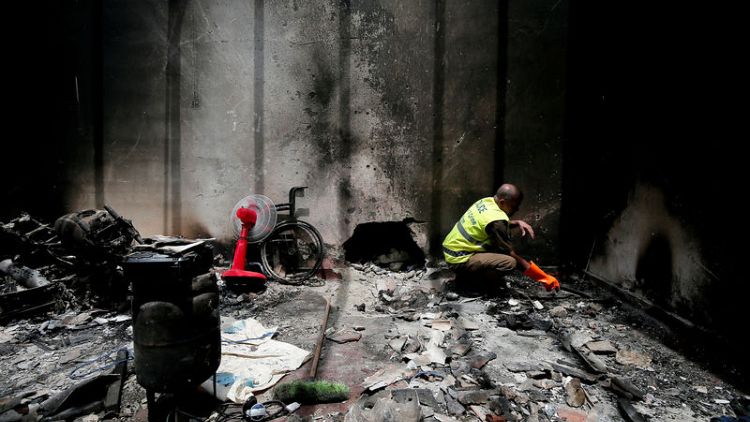COLOMBO (Reuters) - Reuters Colombo correspondent Shihar Aneez was at a hockey game when suicide bombers attacked churches and hotels across Sri Lanka on Easter Sunday, killing over 250 people and wounding hundreds more.
Shihar is the manager of the Royal College Hockey Club and his team was playing a championship game that morning. When he got a message on WhatsApp telling him of an explosion in a church, he called a senior editor with the news and went to work, covering events of the kind he thought his country had seen the last of.
Within minutes he heard of other attacks, including at three major hotels in the heart of Colombo - a ghastly throwback to the bloody civil war between government forces and Tamil separatists that ended in 2009.
This time, the government said, the attacks were carried out by Islamist radicals.
"I went to the Cinnamon Grand, Shangri-la and Kingsberry hotels and saw terrible scenes of devastation and human tragedy," Shihar said. "It reminded me of Sri Lanka's three-decade war when Colombo was the target of frequent bombings by Tamil Tiger rebels."
Shihar had been invited by a news source for breakfast at the Cinnamon that morning, but had postponed the meeting because of the game. That likely saved his life.
He said later: "My phone kept ringing, my head was spinning and a thousand thoughts were going through my mind – a reflection of the 'normal' way of life that I'd gotten used to along with many of my countrymen following the end of the civil war a decade ago."
Most of the journalists in Reuters' Sri Lanka bureau had cut their teeth reporting on the civil war, but in the past decade the story had shifted to the rebuilding of the economy, the arrival of tourists and Chinese investment.
However, the experience of covering conflict soon kicked in, helped by the continued training by Reuters over the years on how to report and stay safe in hostile environments.
DIFFICULT COMMUNICATIONS
Shihar and Ranga Srilal, another Reuters Colombo correspondent, reported the killings on Easter Sunday in the midst of rumours, difficult communications and a government struggling to cope. Verification of information was a huge challenge.
Reuters Television video journalist Waruna Karunatilake, who covered the civil war from the start, was at home when he heard of the attacks. He quickly swung into action, reaching St. Anthony's Church and sending video of the attack there to the editing desk from a small restaurant nearby.
Photojournalist Dinuka Liyanawatte filed initial pictures from his mobile phone to get them out speedily before switching to his main cameras.
Authorities blocked social media to avoid the spread of rumours and there were delays on many international telephone lines because of the volume of calls.
As the full horror of the attacks became clear, tensions mounted in the city that day and later in the week. "Security checks went from zero to top gear," said Shihar.
"I felt the whole country was brought to a standstill. Even during the separatist war, we never saw empty schools, but the Easter Sunday attacks completely shut down all schools and sports activities, not only in Colombo, but across the country."
There were added tensions for Shihar because he is a Muslim and two little-known Islamist groups were blamed for the attacks. "I had to think of my family, myself and covering the news," he said.
Reuters flew in reinforcements from around the region to help cover the events.
One was Shri Navaratnam, a Sri Lanka-born New Zealander, who had also covered the war with the Tamil rebels.
"As I drove out of the airport along with my colleagues, the increased military and police presence with their grim faces looking at you closely, my first thought was, 'Oh my God! We are back to the dark days,'" he said.
Navaratnam is a Tamil and says he faced hostility and suspicion from authorities during the civil war because of his ethnicity.
"I could sense those concerns in my colleague Shihar, and saw my own plight decades ago reflected in his situation," he said. "It is a tough place to be in, remain above the fray and still get the job done."
(Editing by Raju Gopalakrishnan)
